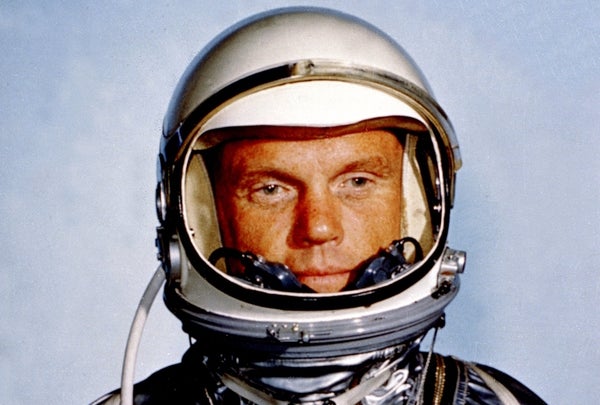This article was published in Scientific American’s former blog network and reflects the views of the author, not necessarily those of Scientific American
Walking out of our astronaut crew quarters on the morning of October 29th, 1998, I felt an extraordinary sense of pride and awe, accompanying my boyhood hero, famed astronaut-turned-Senator John Glenn, on his return to space at age 77. Here was a legendary military fighter pilot, heroic pioneering astronaut and dedicated public servant whom I’d admired since I was a little boy, and I’d be sharing a spaceship with him. When he first came into our crew office months before (as he began his mission training), he quickly squashed our reverence and hero worship with a smile and an admonition: “My name is just John, or Payload Specialist Number 2. If you call me Senator Glenn, I’ll just ignore you!” And many times throughout our training, star-struck engineers, flight controllers, technicians and the public would frequently use the “H-word” with him. He’d quickly and genuinely retreat, bashfully saying he didn’t feel worthy of such high praise. “But being a hero is in the eye of the beholder,” he would add, “and I really appreciate your kind words.”
First and foremost, John was an American patriot, bravely serving his country in air combat through two wars. He then took on even greater risks on the front lines of the cold war, through our contest with the front-running Soviet space program.
I’ll never forget standing at his side in our National Air and Space Museum on the occasion of his retirement from the US Senate in the spring of 1998. Peering through a cockpit window of his tiny Mercury capsule dubbed “Friendship 7,” he matter-of-factly pointed out the caution and warning lights that had been lit during his frightful reentry, with ground controllers uncertain if his heat shield would remain intact and bring him home alive. I felt like I was floating over his shoulder on that historic mission, and he still knew his stuff, inside and out. He never bragged once, but it was clear that he’d loved being a part of this conquest of space, and he still had incredible purpose in life as an American pioneer.
On supporting science journalism
If you're enjoying this article, consider supporting our award-winning journalism by subscribing. By purchasing a subscription you are helping to ensure the future of impactful stories about the discoveries and ideas shaping our world today.
After Project Mercury ended in the early 60’s, he went on to a very successful career as a businessman and public servant, eventually serving four substantive terms in the US Senate, once even throwing his hat into presidential politics. Even through his final years he had an incredible command of policy, technology and history, and I loved discussing world affairs with him, many areas that he had personally shaped. He was also an active pilot well into his 80s, and a role model for not just wannabe young astronauts but older people aspiring to live well and contribute meaningfully, all the way through life.
And you can’t speak of John Glenn without thinking of the love of his life, Annie (Castor) Glenn, whom he’d grown up with and had been married to for over 75 years. Their deep friendship and love for one another was palpable across a room full of people.
Sharing the rare experience of spaceflight with John is my most lasting memory, especially seeing him float up to the flight deck soon after we’d attained orbit. He was seeing the planet below for the first time in 37 years, and I think I saw small tears begin to well in his eyes. President John Fitzgerald Kennedy had decided long ago that he was a national treasure too valuable to risk flying again, but tenacity and scientific purpose convinced the National Institutes of Health and NASA Administrator Dan Goldin that there was good science to be gained by one last trip for him into space. On our mission STS-95, he became the oldest astronaut to ever fly in space, helping us better understand the aging process as well as how to protect astronauts on future missions to Mars and beyond.
John Glenn was my biggest hero as a young boy, my friend and mentor as a fellow astronaut, and he will be a guiding star for future explorers and statesmen long into the future.
Godspeed, John Glenn.
